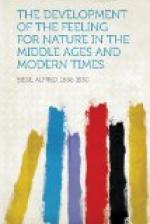Nor rain, wind, thunder, fire are my daughters,
I tax you not, you elements, with unkindness;
I never gave you kingdom, call’d
you children,
You owe me no subscription; then, let
fall
Your horrible pleasure; here I stand,
your slave,
A poor, infirm, weak, and despis’d
old man:
But yet I call you servile ministers,
That will with two pernicious daughters
join
Your high engender’d battles ’gainst
a head
So old and white as this. O!
O! ’tis foul!
How closely here animate and inanimate Nature are woven together, the reasoning with the unreasoning. The poet makes the storm, rain, thunder, and lightning live, and at the same time endues his human figures with a strength of feeling and passion which gives them kinship to the elements. In Othello, too, there is uproar in Nature:
Do but stand upon the foaming shore,
The chidden billow seems to pelt the clouds....
I never did like molestation view
On the enchafed flood.
but even the unruly elements spare Desdemona:
Tempests themselves, high seas and howling winds,
The gather’d rocks and congregated sands.
Traitors ensteep’d to clog the guiltless keel—
As having sense of beauty, do omit
Their mortal natures, letting go safely by
The divine Desdemona.
Cassio lays stress upon ‘the great contention of the sea and skies’; but when Othello meets Desdemona, he cries:
O
my soul’s joy!
If after every tempest come such calms,
May the winds blow till they have wakened
death!
And let the labouring bark climb hills
of seas
Olympus-high, and duck again as low
As hell’s from heaven. If it
were now to die,
’Twere now to be most happy.
Iago calls the elements to witness his truthfulness:
Witness, you ever-burning lights above,
You elements that clip us round about,
Witness, that here Iago doth give up
The execution of his wit, hands, heart,
To wrong’d Othello’s service.
Nature is disgusted at Othello’s jealousy:
Heaven stops the nose at it, and the moon
winks;
The bawdy wind, that kisses all it meets,
Is hush’d within the hollow mine
of earth
And will not hear it.
In terrible mental confusion he cries:
O insupportable, O heavy hour!
Methinks it should be now a huge eclipse
Of sun and moon, and that the affrighted
globe
Should yawn at alteration.
Unhappy Desdemona sings:
The poor soul sat sighing by a sycamore
tree,
Sing all a green willow;
Her hand on her bosom, her head on her
knee,
Sing willow, willow, willow;
The fresh streams ran by her and murmur’d
her moans,
Sing willow, willow, willow.
A song in Cymbeline contains a beautiful personification of flowers:




